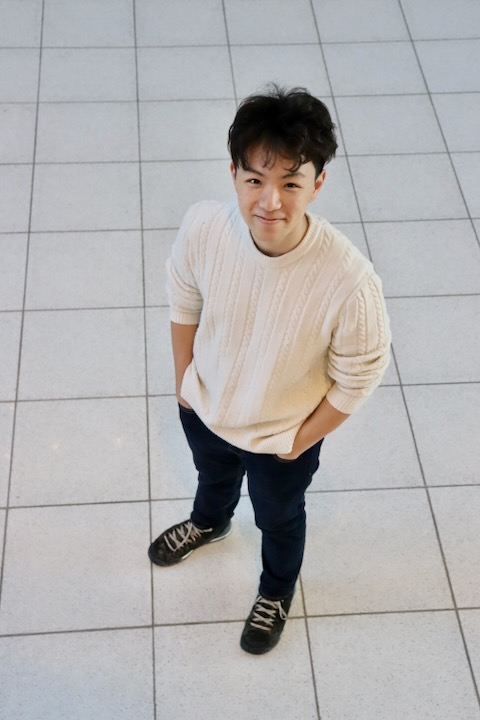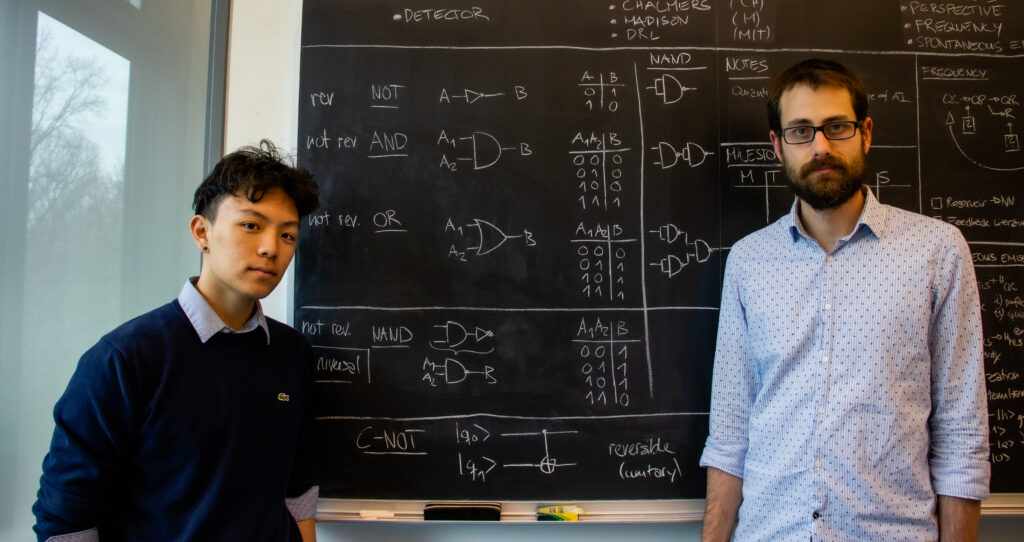Quantum Bootcamp Part VI: What I’ve Learned
Together, Ethan Wang ’26, an economics concentrator, and Wonju Lee, whose college career pauses as he serves in the South Korean Marine Corps, documented their year of learning quantum computing at Princeton Chemistry in our Quantum Bootcamp series. (Here are columns one, two, three, four, five.) In this, the sixth and final column, we offer a Q&A with Wang for a little perspective on what he’s learned.
The originator of and instructor for the project, postdoc Benjamin Lienhard of the Rabitz Group, will teach a quantum computing Wintersession program with Wang this month. A testimony to the subject’s appeal, the session is oversubscribed and a wait list is in place. In the meantime, enjoy this piece as encouragement for novice quantum students everywhere.
PRINCETON CHEMISTRY: During your year-long instruction, there were times when the math was overwhelming. What advice do you have for students facing those challenges?
ETHAN: I think more than anything, having a strong background in math beforehand, up to at least differential equations, can make the process much easier. I stopped right before differential equations, and you can make it through on intuition, for the most part. But there are things you’ll never internalize wholly until you work through the math. I think that has definitely limited my own understanding a fair amount, so I hope to learn the math properly and get through that barrier eventually, too.

Ethan Wang, '26, an economics concentrator, completed an extracurricular, year-long course of study on quantum computing here at Frick Lab.
CHEMISTRY: Name four things that you enjoyed learning ….
ETHAN: First was just the general challenge that comes with the quantum mechanics involved—even just the basic ideas of superpositions and entanglement gave a fascinating extra dimension to my understanding of the world. Second would be the probabilistic side of quantum. Something that comes to mind is the Bell Theorem experiment (which I covered here), and its implications for the structure of the world at large. Third would be the challenges to data that arise due to the quantum nature of that information. One example of this is quantum error correction. Fourth is perhaps the most outward facing appeal of quantum computing: the possible uses and algorithms. This actually comprises a constantly raging debate within the community about the applications and implications of the field.
CHEMISTRY: Speaking of applications, what can you surmise about them at this point?
ETHAN: Altogether, many signs point to us still being many years away from having anything close to practical. But let’s start with perhaps the most obvious element of quantum computing—the algorithms. These link most directly to possible applications. There are some algorithms like Shor’s which, if practically implemented, could hypothetically break all RSA encryption protocols and put the entire web’s privacy and safety in jeopardy.
But we would be well-advised to stay cautious about all the hype surrounding them.
What fields could benefit from the special capabilities of a quantum computer? Finance is one example. It’s unclear what benefit quantum computing would have for chemistry and drug discovery since chemists already have advanced approximations and simulations. There is hope it could be used for fundamental theoretical physics and quantum simulation. Cryptography is another possible field. But in general, the benefits right now are pretty speculative and involve a lot of wishful thinking.
CHEMISTRY: Name a particular advantage and challenge in quantum computing versus classical computing?
ETHAN: The challenge is in quantum error correction. It isn’t something that I thought of even in terms of classical computing. We take for granted the very minimal degree of errors that classical computation allows us. Moving into quantum represents a necessary shift of mindset, since now errors are much more prevalent due to the probabilistic nature of measurement and the effect of entanglement, which means that a problematic error correction code can actually make the error worse. For example, classical computers have one error for roughly every 10^18 operations compared to one for every 10^4 operations for today’s quantum processors.
And with quantum computing, error correction also becomes much more complicated. In order to do these corrections, you need more qubits—and that means that each “logical qubit” or unit of information is actually encoded in many physical qubits (Google’s recent experiment had 49 physical qubits for a single logical one).
And there are two parts to the process—detection and correction. When you are detecting an error, that doesn’t mean that you necessarily know where it is or how it occurred. Just that it has.
The advantage of quantum computing is the ability to encode information in qubits as opposed to classical bits, which allows you to leverage quantum parallelism and interference and take advantage of the unique information structure of quantum systems over the binary structure of classical ones. This can lead to speedups in computation in various aspects, which manifest in the quantum algorithms designed to take advantage of this structure.

Wang and Benjamin Lienhard, a postdoc in the Rabitz Group and instructor for the Quantum Bootcamp series.
CHEMISTRY: Did you acquire enough knowledge in this field to continue studying, and what would you tackle next?
ETHAN: I definitely came nowhere near a proper understanding of the field as a formal education would have provided, but the intuition and the broader strokes are there.
I do believe I am at least well-equipped enough to do a deeper study in the field and not be totally out of my depth. I think getting a sturdier mathematical foundation and getting reps in is the next logical step.
CHEMISTRY: Do you think it’s important for students of any field to have at least a glancing knowledge of quantum computing?
ETHAN: As for the technical specifics of the subject, it’s not something most people will have to know in detail. But I think at the very least some foundational concepts in quantum computing are crucial to a more complete understanding of the world, such as quantum mechanics and the probabilistic elements of nature as a result.
And if it turns out that quantum computers do have some of the capabilities they’re currently predicted to, it will be essential going forward to acknowledge and incorporate those applications in their respective fields.
